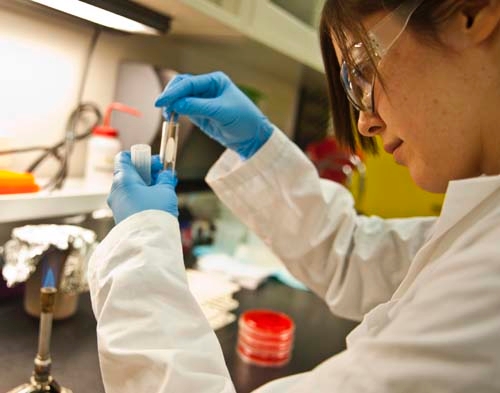UNLV student comes to grandfather’s rescue


Looking back on it now, it is easy to see the connections between the events that ultimately allowed a 24-year-old college student to save her grandfather’s life.
One step led to the next, which led to the next, and so on.
But it was not easy to see then. Then, it seemed only like life.
Joy Immak’s life.
She was born in Japan, and her family moved around a lot when she was a child.
The first serendipitous thing that happened was they moved to Las Vegas when she was a teenager.
She had planned on attending college in Scotland, but financial troubles within her family compelled her to stay home. So she chose UNLV.
She loved it. She signed up for a microbiology course. She took a great interest in it.
So the second serendipitous thing to happen was that she majored in microbiology.
This major led her to take a course last semester taught by professor Helen Wing, Biology 464, which is all about bacterial pathogens.
And Wing, who is from the United Kingdom and has been at the University of Nevada, Las Vegas since 2005, happens to change the specific pathogens she uses as examples in that course from time to time. It adds variety, both for her and for the students.
Last semester, Wing decided to use Clostridium difficile, a nasty bug that’s usually just called C. diff.
The first part of the semester in Biology 464 is typically about how the human body works, how it deals with bacteria, general things like that.
The last part of the course is where specific examples come in. It allows students to see how their lessons can apply in the real world.
So, toward the end of the semester, not long before Christmas, Wing’s students, including Immak, learned about C. diff.
The bacteria, which may reside in the body all the time, can become dangerous after a dose of antibiotics. The antibiotics can kill or weaken much of the other bacteria, leaving a vacuum to be filled.
C. diff is very good at filling that vacuum. It can take over, and can cause such severe diarrhea and intestinal inflammation that, if not treated quickly, can kill a person.
It is most commonly contracted in medical settings; and it is often confused with colitis, a general swelling of the colon with many of the same symptoms, though not usually as severe.
Immak remembers taking a particular interest in the C. diff lesson because she thought the irony was fascinating: that antibiotics, which do so much good, can in fact lead to severe harm in some cases.
She marveled at the paradox.
LONG-DISTANCE DIAGNOSIS
Not long before Christmas last month, Burel Block got sick.
Block is 74 years old, so it was perhaps no surprise to anyone that he was sick. His wife, Patsy, also 74, assumed it was another bout of colitis.
Block is Immak’s grandfather. He lives in a small Texas town, New Boston. It is along Interstate 30 in east Texas, about 20 miles outside of the nearest city, Texarkana, which also has the nearest hospital, and the nearest doctor.
Block has spent his life in education, including teaching foreign languages, serving as a high school principal, and a college instructor.
He is also a pilot. When he was about 40, Immak said, he was in a plane crash. He suffered some neurological damage, which sometimes still causes seizures.
He was on medication. Sometimes the medication caused gout. Sometimes, he would be prescribed antibiotics to take care of the gout.
That happened late last year.
Not long after that, he got sick. Really sick.
His wife, figuring it was colitis, said she took him to the local clinic to see the nurse practitioner.
But his condition worsened. Very severe diarrhea, a very high fever.
Patsy Block happened to tell her granddaughter about what was going on.
Immak wondered aloud if the bacteria she had just learned about in school could be the culprit.
Wouldn’t that be a strange coincidence?
She told her grandmother that she should look it up on the Internet.
So, that’s what her grandmother did.
“You know what, Joy?” she told her granddaughter. “I think you’re on to something.”
Block passed the word along to the nurse and got her husband to the hospital in Texarkana, where they put him in an isolation room.
Soon enough, the doctors there concurred.
Burel Block was a victim of C. diff.
“It was just weird,” Immak said the other day, now that her grandfather is recovering at home. “It all kind of pieced together.
“If I hadn’t told her, she may have never taken him to the hospital.”
And Burel Block might have died.
If not for a series of insignificant events that now look like they were connected all along.
Contact reporter Richard Lake at rlake@reviewjournal.com or 702-383-0307.












